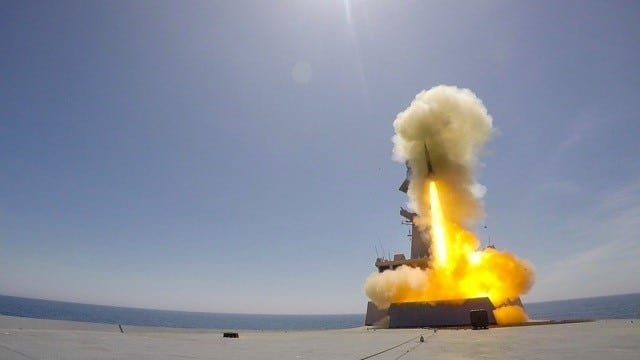MELBOURNE, Australia ― Singapore has given the first glimpse of its latest addition to the multilayered air defense network defending the southeast Asian island nation.
A video posted on social media by the Republic of Singapore Air Force as part of its 50th Anniversary celebrations showed the MBDA Aster 30 SAMP/T medium- to long-range ground-based weapon mounted on a militarized MAN TG-series eight-wheel drive vehicle.
The video also included close-ups of the front and the rear of the eight missile canisters. (The system is shown at approximately the 6m54s and 7m59s marks.)
Singapore announced that it had ordered the Aster 30 SAMP/T in 2013 to replace the Raytheon MIM-23 Improved HAWK missiles currently in service with the Air Force’s 163 Squadron. The country has not disclosed the number of systems it ordered. However, Sweden’s Stockholm International Peace Research Institute said in its annually updated arms trade register that Singapore acquired two systems and 200 Aster 30 missiles, with a reported contract value of €651 million (U.S. $805 million).
The think tank also reported that one system and 100 Aster 30 missiles were delivered in 2017, with an industry source corroborating for Defense News the number of systems delivered so far. The source was unable to comment on the number of missiles delivered. A typical system comprises four to six missile-launch units.
“The RSAF has taken delivery of the Aster 30 missile system,” a Singapore Ministry of Defence spokesperson told Defense News in a statement, adding that the system is undergoing local testing and integration into Singapore’s enhanced Island Air Defence system.
The Aster 30’s weapon is a vertically launched, two-stage, 16-foot surface-to-air missile weighing 990 pounds. The solid-propellant booster shapes the missile trajectory in the direction of the target before separating a few seconds after the launch, with the missile inertially guided up to the midcourse phase using refreshed target data transmitted by the engagement module through the multifunction radar, before switching to an electromagnetic active seeker in the terminal homing phase.
MBDA lists the Aster 30 as having a range in excess of 100 kilometers, or about 63 miles.

Manufacturer MBDA describes the SAMP/T, which stands for Sol-Air Moyenne Portée/Terrestre in French, or Surface-to-Air Medium Range/Land, as a mobile anti-aircraft defense weapon for protection of deployed forces and sensitive sites against missile threats, including cruise, stand-off and ballistic missiles, as well as aircraft.
RELATED

Upgrades to the Aster 30 are planned by development partners France and Italy, with the Block 1 New Technology upgrade to allow the Aster 30 to hit ballistic missiles with a range of 1,000 kilomters. The further-improved block to expected to be able to engage ballistic missiles with a range of up to 3,000 kilometers. The current Aster 30 Block 1 can intercept incoming missiles with a range of 600 kilometers.
Singapore joins France and Italy as customers of the ground-based SAMP/T. However, the Asian nation has decided not to adopt the upgraded Arabel radar and the European command-and-control systems alongside its Aster 30 SAMP/Ts, instead opting for the Thales Ground Master 200 radar and merging it into its own integrated air defense network.
Singapore’s Navy already uses the Aster missile, operating the Aster 15 on its six Formidable-class frigates that began entering service in 2007. Each frigate contains 32 vertical launchers for the shorter-range Aster 15, although it is unknown if the service plans to use the Aster 30 onboard the ships.
Mike Yeo is the Asia correspondent for Defense News.








